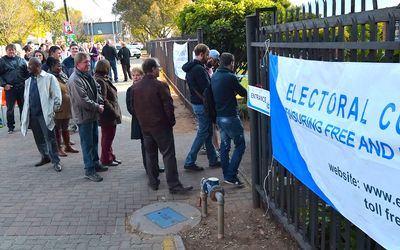
THE conclusion of the 2016 local government elections is an important and happy political moment for SA. Faced with the option of either retreating into tradition or accepting the responsibility of choice, South Africans by and large chose the latter.
"A nation of sheep will beget a government of wolves," American journalist Edward Murrow once wrote. As it turns out, we are not a nation of sheep. Glory days.
In reducing the ANC’s majority from 62% in the 2014 national elections to 54% in the space of just two years, South Africans have delivered the governing party a harsh and much-deserved rebuke. Some pre-election polls might have suggested it, but few really believed such an outcome was likely. And yet, here it is.
President Jacob Zuma once bragged the ANC would rule "until Jesus comes". As many joked as the election results rolled in, He appears to have made a surprisingly early return.
So all of a sudden, the genie is out of the bottle. Africa is replete with examples of liberation heroes riding a wave of gratitude for decades despite increasing evidence of corruption, maladministration and vice. Not here. In this election, South Africans have demonstrated that scandals like Nkandla, maladministration — as at South African Airways and the SABC — and, most of all, the general economic malaise do matter.
The ANC remains SA’s political juggernaut; despite losing support, its voters still number twice those of its nearest rival. Yet the momentum now lies with the opposition — in particular the DA, whose young leader, Mmusi Maimane, has manoeuvred past his first, daunting challenge with great adeptness. In the same vein, the EFF’s commander-in-chief, Julius Malema, is growing in political maturity and popularity.
Yet nestled within this happy victory for accountable governance lies a tricky problem. About 10% of municipalities are now hung councils, including three of the largest. It’s true that many councils prior to the elections were also run by coalitions, but generally these were coalitions of more or less like-minded politicians. The DA and the Congress of the People ran several municipalities together, particularly in the Northern and Western Cape. The ANC and the National Freedom Party ran more than a handful together in KwaZulu-Natal. They were, if you like, coalitions of the willing.
By contrast, the coalitions that will have to be built now will be coalitions of the unwilling, in the sense that the levels of enmity are much higher. They have all forsworn, to a lesser or greater extent, working with each other. How, for example, will the DA, with its liberal economics, really partner with the EFF, which still believes in nationalising all the banks? Relations are sure to be fragile, fraught and testy. Some may not last.
For the South African public this is a moment to be particularly watchful, because citizens have an interest not only in representative government but also in stable government. Politicians naturally want to be in power — this is, after all, the object of the exercise. For the public, it is important that sensible, workable coalitions operate along clear lines with clear goals. Most importantly, they shouldn’t be coalitions that are cobbled together for the sake of executive posts and influence over the administration. And it is more than just the largest parties involved. There is at least one constituency in which the Freedom Front Plus could, if it so desired, operate a municipality — Modimolle — in coalition with the ANC. And wouldn’t that be a turn-up for the books.
The desire for power will be balanced for political parties by an equal and opposite force: the need to retain their identities, particularly in the interests of gaining or regaining an advantage before the even more significant national elections in a couple of years’ time. This desire might perversely tempt politicians to absolve themselves from the responsibility of governing at all, in the hope that the failure of the administration might result in a bigger payoff for them in time. This, too, would be a negative outcome for residents of those municipalities.
The framers of the South African constitution looked at the country and drew an obvious conclusion. This is a country of entrenched divisions along an array of fault lines: race, class, income, geography, age, tribe. The political system they devised was designed, among other things, to try to force South Africans to work together and bridge these chasms.
That requirement has seldom been as relevant and important as it is now.
This article first appeared in Business Day Live
Dated 8 August 2016

Comments
Keep comments free of racism, sexism, homophobia and abusive language. People's Assembly reserves the right to delete and edit comments
(For newest comments first please choose 'Newest' from the 'Sort by' dropdown below.)